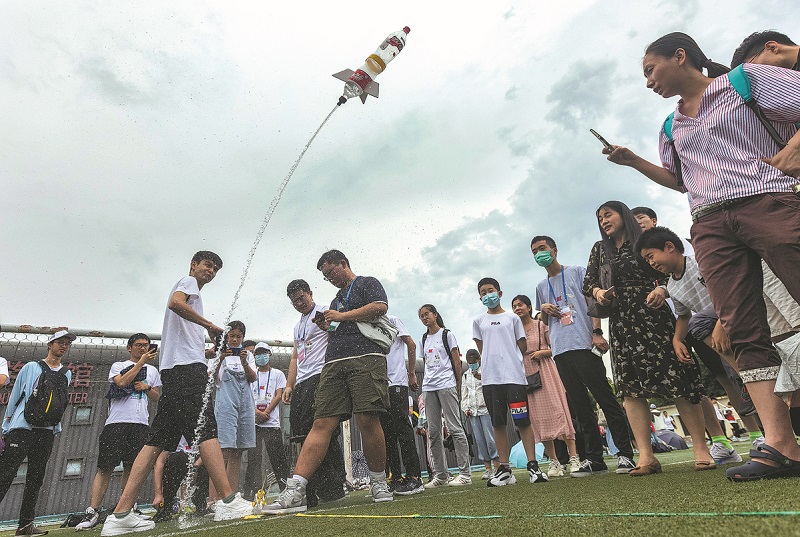NPC deputy urges promotion of science in schools

University teachers help primary and middle school students test a water rocket at Nanjing University of Aeronautics and Astronautics in Jiangsu province on July 17, 2021. [Photo/China News Service]
Academicians and experts in Hubei will visit schools and give science lectures to students, discussing cutting-edge technologies such as artificial intelligence and hot topics including the control of new infectious diseases, officials from the provincial science and technology department said at the seminar.
Xu said a number of science workshops named after academicians and experts have been established.
Xu's workshop, funded by Wuhan's Jiangxia district government, has been given annual targets for the number of lectures to be delivered in schools and the number of publications to be issued.
Universities are also building science and technology museums to give younger students more access to scientific knowledge, Xu said, adding that a textile museum covering 2,000 square meters has been built at Wuhan Textile University.
Xu went to several schools last year to give lectures on traditional and modern textiles, ranging from topics closely related to people's daily lives to a material's application in aerospace.
"I noticed that China has been strengthening science popularization in recent years," he said. "School students have shown interest in science and learned about related majors in colleges."
More efforts should be made to popularize science with appropriate methods rather than regarding exam scores as final goals, he said. Teaching methods were important as students' scientific curiosity varied in schools at different levels, which posed more challenges to educators.
"Those who popularize science with appropriate methods would not put more burdens on younger students," Xu said.
Given the tight schedules of top academicians and experts, Xu said more trained personnel need to engage in the mission, especially high-level researchers in universities and scientific institutions, because "they are grasping the pioneering science and technology, and it only takes simple training in lecturing methods to help them become competent in popularization work".
Xu said he hoped scholars recognized as national-level talent could volunteer to deliver three to five lectures a year, and even establish bases with individual schools to normalize cooperation.
- Top legislature schedules standing committee session for late February
- China's top legislator meets with Uruguayan president
- Senior legislator surveys Anhui on formulating outline of provincial 15th Five-Year Plan
- China's top legislator meets with British PM
- NPC deputies see more engagement with top court



